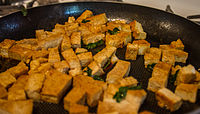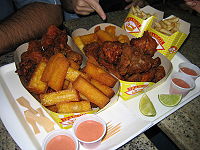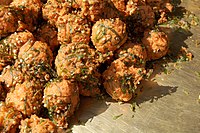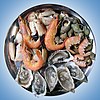Frying: Difference between revisions
m Open access bot: doi updated in citation with #oabot. |
m clean up spacing around commas and other punctuation, replaced: ; → ; (4) |
||
| (9 intermediate revisions by 8 users not shown) | |||
| Line 1: | Line 1: | ||
{{short description|Cooking of food in oil or another fat}} |
{{short description|Cooking of food in oil or another fat}} |
||
{{For|other uses of "fry" or "frying"|Fry (disambiguation){{!}}Fry}} |
{{For|other uses of "fry" or "frying"|Fry (disambiguation){{!}}Fry}} |
||
{{ |
{{more citations needed|date=May 2015}} |
||
[[File:PLAINTAIN.jpg|thumb|[[Fried plantain]]]] |
[[File:PLAINTAIN.jpg|thumb|[[Fried plantain]]]] |
||
'''Frying''' is the [[cooking]] of food in [[cooking oil|oil]] or another [[fat]].{{efn|Chemically, oils and fats are the same, differing only in [[melting point]], and the distinction is only made when needed. Foods can be fried in a variety of [[fat]]s, including [[lard]], [[vegetable oil]], [[rapeseed oil]], and [[olive oil]]. In commerce, many fats are called oils by custom, e.g. [[palm oil]] and [[coconut oil]], which are solid at [[room temperature]].}}<ref>{{cite book|last1=editor|first1=Prosper Montagné |
'''Frying''' is the [[cooking]] of food in [[cooking oil|oil]] or another [[fat]].{{efn|Chemically, oils and fats are the same, differing only in [[melting point]], and the distinction is only made when needed. Foods can be fried in a variety of [[fat]]s, including [[lard]], [[vegetable oil]], [[rapeseed oil]], and [[olive oil]]. In commerce, many fats are called oils by custom, e.g. [[palm oil]] and [[coconut oil]], which are solid at [[room temperature]].}}<ref>{{cite book|last1=editor|first1=Prosper Montagné; American|last2=Escoffier|first2=Charlotte Turgeon; pref. by Robert J. Courtine; original preface by Auguste|last3=Hunter|first3=Philéas Gilbert; text translated from the French by Marion|title=The New Larousse Gastronomique : The Encyclopedia of Food, Wine & Cookery|date=1977|publisher=Crown Publishers|location=New York|isbn=0-517-53137-2|pages=[https://archive.org/details/newlaroussegastr00mont_0/page/299 299, 307]|url-access=registration|url=https://archive.org/details/newlaroussegastr00mont_0/page/299}}</ref> Similar to [[sautéing]], pan-fried foods are generally turned over once or twice during cooking to make sure that the food is evenly cooked, using [[tongs]] or a [[spatula]], whilst sautéed foods are cooked by "tossing in the pan".<ref>{{Cite book| publisher = Artisan Books| isbn = 978-1-57965-236-4| last = Peterson| first = James| title = Essentials of Cooking| date = April 2003}}</ref> A large variety of foods may be fried. |
||
==History== |
==History== |
||
| Line 10: | Line 10: | ||
[[File:Morozov AI 009.jpg|thumb|A painting by the Russian artist [[Alexander Ivanovich Morozov|A. I. Morozov]] showing frying in the open air]] |
[[File:Morozov AI 009.jpg|thumb|A painting by the Russian artist [[Alexander Ivanovich Morozov|A. I. Morozov]] showing frying in the open air]] |
||
Frying is believed to have first appeared in the [[Ancient Egypt]]ian [[Ancient Egyptian cuisine|kitchen]], during the [[Old Kingdom of Egypt|Old Kingdom]], around 2500 BC.<ref name='Tannahill'>Tannahill, Reay. (1995). ''Food in History''. Three Rivers Press. p. 75</ref> |
Frying is believed to have first appeared in the [[Ancient Egypt]]ian [[Ancient Egyptian cuisine|kitchen]], during the [[Old Kingdom of Egypt|Old Kingdom]], around 2500 BC.<ref name='Tannahill'>Tannahill, Reay. (1995). ''Food in History''. Three Rivers Press. p. 75</ref> Around the Middle Ages, fried food became a common delicacy for wealthy people, with fried meats and vegetables becoming popular dishes.<ref name='Gambero Rosso'>{{Cite web |date=2021-04-28 |title=History of frying. How the Italian mixed fry was born |url=https://www.gamberorossointernational.com/news/history-of-fried-food-amid-myth-and-legend/ |access-date=2024-07-06 |website=Gambero Rosso International |language=en}}</ref> |
||
It is believed that frying was created, and used, as a way to preserve food. |
It is believed that frying was created, and used, as a way to preserve food.<ref>{{Cite web |title=Why Do We Fry Food in Oil? |url=http://www.timotis.com/news-1/deep-fried-food |access-date=2023-03-07 |website=Timoti's |date=27 January 2023 |language=en-US}}</ref> |
||
== Variations == |
== Variations == |
||
Unlike water, fats can reach [[temperature]]s much higher than 100°C (212°F) before boiling. This paired with their heat absorption properties, neutral or desired taste, and non-toxicity, makes them uniquely valuable in cooking, especially frying. As a result, they are used in a wide variety of cuisines. |
Unlike water, fats can reach [[temperature]]s much higher than 100 °C (212 °F) before boiling. This paired with their heat absorption properties, neutral or desired taste, and non-toxicity, makes them uniquely valuable in cooking, especially frying. As a result, they are used in a wide variety of cuisines. |
||
Through frying, one can sear or even [[Carbonization|carbonize]] the surface of foods while [[Caramelization|caramelizing]] sugars. The food is cooked much more quickly and has a characteristic crispness and texture. Depending on the food, the fat will penetrate it to varying degrees, contributing richness, lubricity, its own flavour, and calories. |
Through frying, one can sear or even [[Carbonization|carbonize]] the surface of foods while [[Caramelization|caramelizing]] sugars. The food is cooked much more quickly and has a characteristic crispness and texture. Depending on the food, the fat will penetrate it to varying degrees, contributing richness, lubricity, its own flavour, and calories. |
||
| Line 28: | Line 28: | ||
== Health == |
== Health == |
||
A 2021 [[meta-analysis]] found that the highest category of fried food consumption compared to the lowest is associated with a 3% increase in the risk of all-cause [[Mortality rate|mortality]], as well as with a 2% increase in the risk of [[cardiovascular disease|cardiovascular]] mortality.<ref name=qin-mortality>{{cite journal |vauthors=Qin P, Zhang M, Han M, Liu D, Luo X, Xu L, Zeng Y, Chen Q, Wang T, Chen X, Zhou Q, Li Q, Qie R, Wu X, Li Y, Zhang Y, Wu Y, Hu D, Hu F |title=Fried-food consumption and risk of cardiovascular disease and all-cause mortality: a meta-analysis of observational studies |journal=Heart |volume=107 |issue=19 |pages=1567–1575 |date=October 2021 |pmid=33468573 |doi=10.1136/heartjnl-2020-317883 |url=}}</ref> Compared to participants with a low intake, those who ate the most fried food had a 37% increased risk of [[heart failure]], a 28% increased risk of major cardiovascular events, and a 22% increased risk of [[coronary heart disease]].<ref name=qin-mortality></ref> The risk of [[stroke]], heart failure, and [[Myocardial infarction|heart attack]] modestly increased with the increase of weekly servings of fried food.<ref name=qin-mortality></ref> The study concluded that fried food consumption may increase the risk of cardiovascular disease and presents a linear [[dose–response relationship|dose-response relation]].<ref name=qin-mortality></ref> The researchers theorized the main reasons behind these associations are the high trans fat and calorie content of fried foods and their [[pro-inflammatory]] nature.<ref name=qin-mortality></ref> It was also noted that eating [[hyperpalatable]] crisp-fried foods may entice people to engage in routine overeating.<ref name=qin-mortality></ref> |
|||
A 2023 meta-analysis found that fried food consumption is linked to a 52% increase in the risk of [[stomach cancer]].<ref>{{cite journal |vauthors=Zhang T, Song SS, Liu M, Park S |title=Association of Fried Food Intake with Gastric Cancer Risk: A Systemic Review and Meta-Analysis of Case-Control Studies |journal=Nutrients |volume=15 |issue=13 |date=June 2023 |page=2982 |pmid=37447308 |pmc=10347084 |doi=10.3390/nu15132982 |doi-access=free |url=}}</ref> Fried food intake is also associated with [[prehypertension]],<ref name=provido>{{cite journal |vauthors=Provido SM, Abris GP, Hong S, Yu SH, Lee CB, Lee JE |title=Association of fried food intake with prehypertension and hypertension: the Filipino women's diet and health study |journal=Nutr Res Pract |volume=14 |issue=1 |pages=76–84 |date=February 2020 |pmid=32042377 |pmc=6997139 |doi=10.4162/nrp.2020.14.1.76 |url=}}</ref> [[hypertension]]<ref>{{cite journal |vauthors=Sayon-Orea C, Bes-Rastrollo M, Gea A, Zazpe I, Basterra-Gortari FJ, Martinez-Gonzalez MA |title=Reported fried food consumption and the incidence of hypertension in a Mediterranean cohort: the SUN (Seguimiento Universidad de Navarra) project |journal=Br J Nutr |volume=112 |issue=6 |pages=984–91 |date=September 2014 |pmid=25201306 |doi=10.1017/S0007114514001755 |url=}}</ref><ref>{{cite journal |vauthors=Kang Y, Kim J |title=Association between fried food consumption and hypertension in Korean adults |journal=Br J Nutr |volume=115 |issue=1 |pages=87–94 |date=January 2016 |pmid=26449129 |doi=10.1017/S000711451500402X |url=}}</ref><ref name=provido |
A 2021 [[meta-analysis]] found that the highest category of fried food consumption compared to the lowest is associated with a 3% increase in the risk of all-cause [[Mortality rate|mortality]], as well as with a 2% increase in the risk of [[cardiovascular disease|cardiovascular]] mortality.<ref name=qin-mortality>{{cite journal |vauthors=Qin P, Zhang M, Han M, Liu D, Luo X, Xu L, Zeng Y, Chen Q, Wang T, Chen X, Zhou Q, Li Q, Qie R, Wu X, Li Y, Zhang Y, Wu Y, Hu D, Hu F |title=Fried-food consumption and risk of cardiovascular disease and all-cause mortality: a meta-analysis of observational studies |journal=Heart |volume=107 |issue=19 |pages=1567–1575 |date=October 2021 |pmid=33468573 |doi=10.1136/heartjnl-2020-317883 |url=}}</ref> Compared to participants with a low intake, those who ate the most fried food had a 37% increased risk of [[heart failure]], a 28% increased risk of major cardiovascular events, and a 22% increased risk of [[coronary heart disease]].<ref name=qin-mortality /> The risk of [[stroke]], heart failure, and [[Myocardial infarction|heart attack]] modestly increased with the increase of weekly servings of fried food.<ref name=qin-mortality /> The study concluded that fried food consumption may increase the risk of cardiovascular disease and presents a linear [[dose–response relationship|dose-response relation]].<ref name=qin-mortality /> The researchers theorized the main reasons behind these associations are the high trans fat and calorie content of fried foods and their [[pro-inflammatory]] nature.<ref name=qin-mortality /> It was also noted that eating [[hyperpalatable]] crisp-fried foods may entice people to engage in routine overeating.<ref name=qin-mortality /> |
||
A 2023 meta-analysis found that fried food consumption is linked to a 52% increase in the risk of [[stomach cancer]].<ref>{{cite journal |vauthors=Zhang T, Song SS, Liu M, Park S |title=Association of Fried Food Intake with Gastric Cancer Risk: A Systemic Review and Meta-Analysis of Case-Control Studies |journal=Nutrients |volume=15 |issue=13 |date=June 2023 |page=2982 |pmid=37447308 |pmc=10347084 |doi=10.3390/nu15132982 |doi-access=free |url=}}</ref> Fried food intake is also associated with [[prehypertension]],<ref name=provido>{{cite journal |vauthors=Provido SM, Abris GP, Hong S, Yu SH, Lee CB, Lee JE |title=Association of fried food intake with prehypertension and hypertension: the Filipino women's diet and health study |journal=Nutr Res Pract |volume=14 |issue=1 |pages=76–84 |date=February 2020 |pmid=32042377 |pmc=6997139 |doi=10.4162/nrp.2020.14.1.76 |url=}}</ref> [[hypertension]]<ref>{{cite journal |vauthors=Sayon-Orea C, Bes-Rastrollo M, Gea A, Zazpe I, Basterra-Gortari FJ, Martinez-Gonzalez MA |title=Reported fried food consumption and the incidence of hypertension in a Mediterranean cohort: the SUN (Seguimiento Universidad de Navarra) project |journal=Br J Nutr |volume=112 |issue=6 |pages=984–91 |date=September 2014 |pmid=25201306 |doi=10.1017/S0007114514001755 |url=}}</ref><ref>{{cite journal |vauthors=Kang Y, Kim J |title=Association between fried food consumption and hypertension in Korean adults |journal=Br J Nutr |volume=115 |issue=1 |pages=87–94 |date=January 2016 |pmid=26449129 |doi=10.1017/S000711451500402X |url=}}</ref><ref name=provido /><ref name=qin-diseases>{{cite journal |vauthors=Qin P, Liu D, Wu X, Zeng Y, Sun X, Zhang Y, Li Y, Wu Y, Han M, Qie R, Huang S, Zhao Y, Feng Y, Yang X, Liu Y, Li H, Zhang M, Hu D, Hu F |title=Fried-food consumption and risk of overweight/obesity, type 2 diabetes mellitus, and hypertension in adults: a meta-analysis of observational studies |journal=Crit Rev Food Sci Nutr |volume=62 |issue=24 |pages=6809–6820 |date=2022 |pmid=33825582 |doi=10.1080/10408398.2021.1906626 |url=}}</ref> and [[obesity]].<ref name=qin-diseases /><ref>{{cite journal |vauthors=Guallar-Castillón P, Rodríguez-Artalejo F, Fornés NS, Banegas JR, Etxezarreta PA, Ardanaz E, Barricarte A, Chirlaque MD, Iraeta MD, Larrañaga NL, Losada A, Mendez M, Martínez C, Quirós JR, Navarro C, Jakszyn P, Sánchez MJ, Tormo MJ, González CA |title=Intake of fried foods is associated with obesity in the cohort of Spanish adults from the European Prospective Investigation into Cancer and Nutrition |journal=Am J Clin Nutr |volume=86 |issue=1 |pages=198–205 |date=July 2007 |pmid=17616781 |doi=10.1093/ajcn/86.1.198 |url=|doi-access=free }}</ref> |
|||
<gallery widths="200px" heights="200px"> |
<gallery widths="200px" heights="200px"> |
||
| Line 37: | Line 37: | ||
Gordurema.jpg|Fried [[polenta]], [[French fries]], and [[fried chicken]] at a Brazilian eatery |
Gordurema.jpg|Fried [[polenta]], [[French fries]], and [[fried chicken]] at a Brazilian eatery |
||
Pakoras in Jaipur.jpg|[[Pakora]] is a fried snack, popular throughout the [[Indian subcontinent]], served in [[Jaipur, India]]. |
Pakoras in Jaipur.jpg|[[Pakora]] is a fried snack, popular throughout the [[Indian subcontinent]], served in [[Jaipur, India]]. |
||
Guasteddra dolce Caltanissetta 01.jpg|[[guasteddra|Guastedde]] a fried Sicilian dessert, in a shop window |
|||
</gallery> |
</gallery> |
||
Latest revision as of 01:38, 24 December 2024
This article needs additional citations for verification. (May 2015) |

Frying is the cooking of food in oil or another fat.[a][1] Similar to sautéing, pan-fried foods are generally turned over once or twice during cooking to make sure that the food is evenly cooked, using tongs or a spatula, whilst sautéed foods are cooked by "tossing in the pan".[2] A large variety of foods may be fried.
History
[edit]This section needs expansion. You can help by adding to it. (December 2009) |

Frying is believed to have first appeared in the Ancient Egyptian kitchen, during the Old Kingdom, around 2500 BC.[3] Around the Middle Ages, fried food became a common delicacy for wealthy people, with fried meats and vegetables becoming popular dishes.[4]
It is believed that frying was created, and used, as a way to preserve food.[5]
Variations
[edit]Unlike water, fats can reach temperatures much higher than 100 °C (212 °F) before boiling. This paired with their heat absorption properties, neutral or desired taste, and non-toxicity, makes them uniquely valuable in cooking, especially frying. As a result, they are used in a wide variety of cuisines.
Through frying, one can sear or even carbonize the surface of foods while caramelizing sugars. The food is cooked much more quickly and has a characteristic crispness and texture. Depending on the food, the fat will penetrate it to varying degrees, contributing richness, lubricity, its own flavour, and calories.
Frying techniques vary in the amount of fat required, the cooking time, the type of cooking vessel required, and the manipulation of the food. Sautéing, stir-frying, pan frying, shallow frying, deep frying, and air frying are all standard frying techniques.
Pan-frying, sautéing, and stir-frying involve cooking foods in a thin layer of fat on a hot surface, such as a frying pan, griddle, wok, or sautee. Stir frying involves frying quickly at very high temperatures, requiring that the food be stirred continuously to prevent it from adhering to the cooking surface and burning.
Shallow frying is a type of pan frying using only enough fat to immerse approximately one-third to one-half of each piece of food; fat used in this technique is typically only used once. Deep-frying, on the other hand, involves totally immersing the food in hot oil, which is normally topped up and used several times before being disposed of. Deep-frying is typically a much more involved process and may require specialized oils for optimal results.
Deep frying is now the basis of a very large and expanding worldwide industry. Fried products have consumer appeal in all age groups and in virtually all cultures, and the process is quick, can easily be made continuous for mass production, and the food emerges sterile and dry, with a relatively long shelf life. The end products can then be easily packaged for storage and distribution. Some include potato chips, French fries, nuts, doughnuts, and instant noodles.
Health
[edit]A 2021 meta-analysis found that the highest category of fried food consumption compared to the lowest is associated with a 3% increase in the risk of all-cause mortality, as well as with a 2% increase in the risk of cardiovascular mortality.[6] Compared to participants with a low intake, those who ate the most fried food had a 37% increased risk of heart failure, a 28% increased risk of major cardiovascular events, and a 22% increased risk of coronary heart disease.[6] The risk of stroke, heart failure, and heart attack modestly increased with the increase of weekly servings of fried food.[6] The study concluded that fried food consumption may increase the risk of cardiovascular disease and presents a linear dose-response relation.[6] The researchers theorized the main reasons behind these associations are the high trans fat and calorie content of fried foods and their pro-inflammatory nature.[6] It was also noted that eating hyperpalatable crisp-fried foods may entice people to engage in routine overeating.[6]
A 2023 meta-analysis found that fried food consumption is linked to a 52% increase in the risk of stomach cancer.[7] Fried food intake is also associated with prehypertension,[8] hypertension[9][10][8][11] and obesity.[11][12]
-
Tofu being fried
-
Guastedde a fried Sicilian dessert, in a shop window
See also
[edit]Notes
[edit]- ^ Chemically, oils and fats are the same, differing only in melting point, and the distinction is only made when needed. Foods can be fried in a variety of fats, including lard, vegetable oil, rapeseed oil, and olive oil. In commerce, many fats are called oils by custom, e.g. palm oil and coconut oil, which are solid at room temperature.
References
[edit]- ^ editor, Prosper Montagné; American; Escoffier, Charlotte Turgeon; pref. by Robert J. Courtine; original preface by Auguste; Hunter, Philéas Gilbert; text translated from the French by Marion (1977). The New Larousse Gastronomique : The Encyclopedia of Food, Wine & Cookery. New York: Crown Publishers. pp. 299, 307. ISBN 0-517-53137-2.
{{cite book}}:|last1=has generic name (help)CS1 maint: multiple names: authors list (link) - ^ Peterson, James (April 2003). Essentials of Cooking. Artisan Books. ISBN 978-1-57965-236-4.
- ^ Tannahill, Reay. (1995). Food in History. Three Rivers Press. p. 75
- ^ "History of frying. How the Italian mixed fry was born". Gambero Rosso International. 2021-04-28. Retrieved 2024-07-06.
- ^ "Why Do We Fry Food in Oil?". Timoti's. 27 January 2023. Retrieved 2023-03-07.
- ^ a b c d e f Qin P, Zhang M, Han M, Liu D, Luo X, Xu L, Zeng Y, Chen Q, Wang T, Chen X, Zhou Q, Li Q, Qie R, Wu X, Li Y, Zhang Y, Wu Y, Hu D, Hu F (October 2021). "Fried-food consumption and risk of cardiovascular disease and all-cause mortality: a meta-analysis of observational studies". Heart. 107 (19): 1567–1575. doi:10.1136/heartjnl-2020-317883. PMID 33468573.
- ^ Zhang T, Song SS, Liu M, Park S (June 2023). "Association of Fried Food Intake with Gastric Cancer Risk: A Systemic Review and Meta-Analysis of Case-Control Studies". Nutrients. 15 (13): 2982. doi:10.3390/nu15132982. PMC 10347084. PMID 37447308.
- ^ a b Provido SM, Abris GP, Hong S, Yu SH, Lee CB, Lee JE (February 2020). "Association of fried food intake with prehypertension and hypertension: the Filipino women's diet and health study". Nutr Res Pract. 14 (1): 76–84. doi:10.4162/nrp.2020.14.1.76. PMC 6997139. PMID 32042377.
- ^ Sayon-Orea C, Bes-Rastrollo M, Gea A, Zazpe I, Basterra-Gortari FJ, Martinez-Gonzalez MA (September 2014). "Reported fried food consumption and the incidence of hypertension in a Mediterranean cohort: the SUN (Seguimiento Universidad de Navarra) project". Br J Nutr. 112 (6): 984–91. doi:10.1017/S0007114514001755. PMID 25201306.
- ^ Kang Y, Kim J (January 2016). "Association between fried food consumption and hypertension in Korean adults". Br J Nutr. 115 (1): 87–94. doi:10.1017/S000711451500402X. PMID 26449129.
- ^ a b Qin P, Liu D, Wu X, Zeng Y, Sun X, Zhang Y, Li Y, Wu Y, Han M, Qie R, Huang S, Zhao Y, Feng Y, Yang X, Liu Y, Li H, Zhang M, Hu D, Hu F (2022). "Fried-food consumption and risk of overweight/obesity, type 2 diabetes mellitus, and hypertension in adults: a meta-analysis of observational studies". Crit Rev Food Sci Nutr. 62 (24): 6809–6820. doi:10.1080/10408398.2021.1906626. PMID 33825582.
- ^ Guallar-Castillón P, Rodríguez-Artalejo F, Fornés NS, Banegas JR, Etxezarreta PA, Ardanaz E, Barricarte A, Chirlaque MD, Iraeta MD, Larrañaga NL, Losada A, Mendez M, Martínez C, Quirós JR, Navarro C, Jakszyn P, Sánchez MJ, Tormo MJ, González CA (July 2007). "Intake of fried foods is associated with obesity in the cohort of Spanish adults from the European Prospective Investigation into Cancer and Nutrition". Am J Clin Nutr. 86 (1): 198–205. doi:10.1093/ajcn/86.1.198. PMID 17616781.






